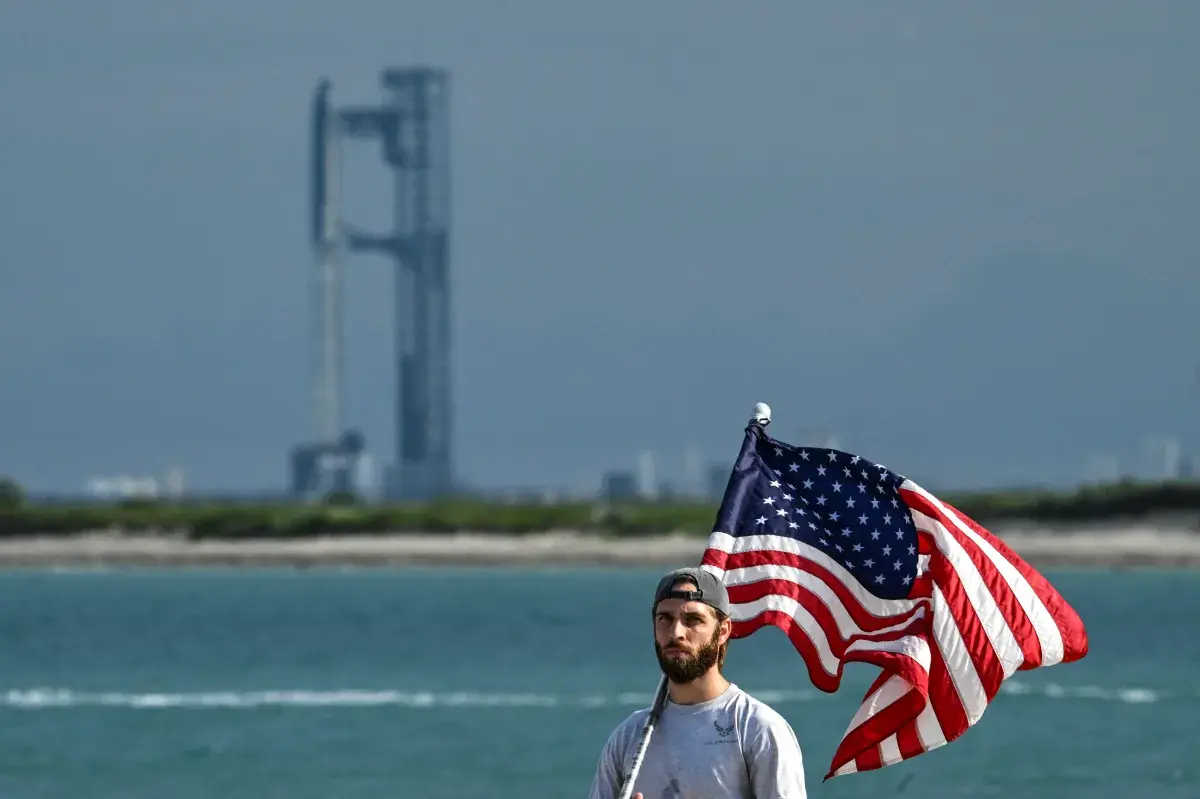
As a fierce competition between the United States and China heats up on Earth, a new bill in Congress hopes to give Washington an edge on another frontier that has the potential to reshape the future of great power rivalry.
The legislative proposal, known as the Licensing Aerospace Units to New Commercial Heights—or LAUNCH—Act, calls on the government “to streamline the application of regulations relating to commercial space launch and reentry requirements and licensing of private remote sensing space systems.” The bill was introduced to the House of Representatives on Friday by Republican Representative August Pfluger, of Texas, who argued the necessity of rejuvenating and revamping the U.S. approach to space travel.
“President Reagan once described space as a ‘new frontier’, noting that our willingness to explore it ‘will reflect whether America’s men and women today have the same bold vision, courage, and indomitable spirit that made us a great nation.’ He was right,” Pluger told Newsweek. “Space exploration and dominance are vital to America’s long-term strength and security.”
“As adversaries like China seek to weaponize and exploit the space domain and the emerging technologies that come from it, we must implement long-overdue regulatory reforms that keep the United States at the forefront,” Pfluger, who previously served on the National Security Council during President Donald Trump’s first administration, added. “My bill delivers on that mission by modernizing current regulations to support innovation at critical spaceports nationwide, including Midland Spaceport, which I am extremely proud to represent.”
The move follows the introduction of an identical proposal in the Senate in June by Republican Senators Rick Scott and John Cornyn, cosponsored by Democratic Senators Ben Ray Lujan and Mark Kelly, a former astronaut. A previous iteration introduced last year was also backed by a bipartisan group of lawmakers, including then-Senator Marco Rubio, now serving as secretary of state under the second Trump administration.
And with Beijing accelerating its space innovation and reports warning it could soon overtake Washington in the field, the White House is also moving to solidify its position in the extraterrestrial contest, even as China asserts its journey to the stars is solely for peaceful purposes.
The Fight for the Final Frontier
The U.S. has been viewed as the world’s leading space power ever since Neil Armstrong stepped foot on the moon. Washington claims by far the largest number of satellites and took the lead last year for total number of orbital launches, more than half of which were conducted by SpaceX, the private company owned by Elon Musk.
But the U.S. was not always the undisputed leader in space. The Soviet Union managed to score many of the first key accomplishments in the Cold War-era “space race,” including launching the first satellite in orbit and first human in space long before Armstrong’s “one small step.” The competition ultimately forged space-related cooperation between Washington and Moscow that remains somewhat active today despite icy ties over the war in Ukraine.
While a number of nations have since entered the fray in space exploration, the stunning achievements of China, in particular, in recent decades have demonstrated the current U.S. position is not guaranteed, either. The People’s Republic has pressed forward with an impressive campaign of technological breakthroughs, including sending robotic rovers to the moon and Mars and even accomplishing its own historic first in landing and operating a spacecraft on the far side of the moon in 2019.
Banned from the International Space Station (ISS)—a joint project between the U.S., Russia, the European Union, Japan and Canada—through a 2011 U.S. law, China also became the second nation after the U.S. to independently construct, launch and operate its own space station, the Tiangong, in 2021. With the ISS scheduled to retire in the early 2030s, it will likely be replaced by a commercial project, setting up the Tiangong to soon become the sole state-run space station in orbit.
Meanwhile, Beijing and Moscow are in talks to operate what would be the world’s first permanent base on the moon within the decade, an accomplishment Washington is also scrambling to secure. The U.S. and China also both have their eyes set on further exploration of Mars, widely seen as a key focus of the 21st century space race.
As the competition intensifies, one leading U.S. group backing the LAUNCH Act, the Commercial Space Federation, outlined in a report issued earlier this month how repeated delays in U.S.-led space initiatives were being outmatched by a Chinese program that “is not slowing down but accelerating beyond America’s pace in many areas.”
“They are not deviating from their ‘Space Dream’—China is living its Apollo, ISS, and commercial space eras all at once, bringing new strategic, economic, and commercial risks for America,” the report stated, concluding that “China’s space program has matured rapidly—driven by strategic patience and state investment—meeting and often exceeding its goals, reshaping global space power, and posing complex risks to U.S. industry. China remains fully committed to its roadmap and milestones and will use all available resources to become a global leader in space.”
For All Mankind
While the last bilateral bout between superpowers over space resolved in detente and collaboration, followed ultimately by the collapse of the Soviet Union, the U.S. has only hardened its position against its new communist competitor, which shows little sign of decline. The framing of the LAUNCH Act as means of challenging China demonstrates lawmakers are also driven by concerns of their country falling behind.
From Beijing’s perspective, however, it’s not opposition but rather opportunity for cooperation that colors the official view of international efforts toward space exploration.
“China is committed to the peaceful use of outer space, and opposes any arms race in outer space or weaponizing it,” Liu Pengyu, spokesperson for the Chinese Embassy to the U.S., told Newsweek. “China has no intention to engage in a space race, nor do we seek so-called edge in outer space.”
“Understanding and exploring the universe is humanity’s shared aspiration and the peaceful use of space will improve the well-being of all,” Liu said. “We stand ready to deepen international space exchanges and cooperation, share development fruits with other countries, and unravel the mysteries of the universe on the basis of equality, mutual benefit, peaceful use and inclusive development.”
Thus far, such arguments do not appear to be gaining much traction in the Trump administration. Going beyond the 2011 Wolf Amendment that prohibits not only China’s participation in the ISS but also any work with NASA, the U.S. space agency recently banned all Chinese citizens with U.S. visas from participating in agency programs, according to a Bloomberg report later confirmed by officials.
“China is NOT going to the moon with good intentions,” NASA Administration Sean Duffy wrote on X last week. “America will get there FIRST, preserving peace for both the U.S. and our international partners.”
Key Democrats with experience in the field also see the need to reinvigorate U.S. space ambitions, and view the LAUNCH Act as a critical piece of legislation toward removing obstacles in this endeavor.
“As someone who has had the privilege of leading both NASA and a commercial space company, I’ve seen firsthand how outdated and duplicative regulations can slow down American innovation,” said Democratic Representative George Whitesides of California, former NASA chief of staff under President Barack Obama and head of Virgin Galactic now serving as co-lead for the LAUNCH Act.



